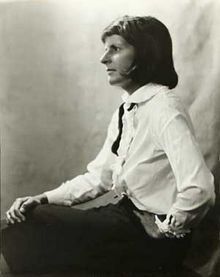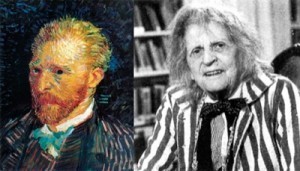If you want to write …
[image error]If ever I had a book to share, it would be If You Want To Write, by Brenda Ueland. I read this book at a time when I was feeling self-conscious about letting people read my work, and I must say, it totally changed my perspective. From beginning to end you won't find a single page detailing gramar, punctuation, etc. For this isn't a book about editing. Instead, the focus is on the actual writing process: how to get your words flowing, keep it real, and make your story honest. Her advice is so real that it resonates deep down where your imagination lingers. Here are a few quotes that really got me going.
"Everybody is original, if he tells the truth, if he speaks from himself. But it must be from his true self and not from the self he thinks he should be." If You Want To Write, Chapter 1, p. 4
"Well, Van Gogh was one of the great painters. During his life he made only 109 dollars in all on his painting. They are now worth about two million dolars. He had a terribly hard life-loneliness, poverty and starvation that led to insanity. And yet it was one of the greatest lives
that was ever lived-the happiest, the most burningly incandescent." If You Want To Write, Chapter 3, p. 23. — I particularly enjoyed this chapter since Van Gogh is my all-time favorite artist. I sometimes wonder how sad it would be had the world missed out on his genius. Then I think of all the amazing composers I met while I was studying music composition in college. I know they probably won't ever make it big, but that doesn't mean their art isn't worth the effort.
Chapter 4 is entitled, "The Imagination Works Slowly and Quietly." This reminds me of the famous line, "you can't rush art." And, you can't. Sometimes you just need time to think it over. And over, and over again. There's nothing wrong with letting your mind play with an idea, try it on for size, then chuck or keep it depending upon what you finally decide. The point is, let it fester a while. This in no way negates the practice that sometimes you should just spill those words upon the page as fast as you can. Brainstorm in every way shape and form to find out what works best for you.
In Chapter 5 she talks about taking a walk. Can you see me smiling? Walking allowed her imagination to loosen, and once that happened free thought took place. It was during these walks that she came up with some of her best ideas. I can't tell you how much I related to this chapter, since I think brainstorming is absolutely crucial. Although I enjoy walking to, I prefer to brainstorm in the dark with absolute silence, and I do it every single night before I go to bed. Such simple technics can bring about so much productivity. Then she adds this thought so as to explain that pure imagination isn't something that requires painful work. "I tell you this so that you will stop thinking of the creative power as nervous and effortful; in fact, it can be frightened away by nervous straining." p. 47. Boy, isn't that the truth! In my opinion, allowing the mind to flow is the single best technic for creative writing.
 Chapter 7 was probably my favorite: "Be Careless! Be a Lion! Be a Pirate! When You Write." She continues, "People are too scared, too self-conscious, too proud, too shy. They have been taught too many things about construction, plot, unity, mass and coherence. (They write) to impress people." I couldn't agree more. That was my problem for years. I was way too self-conscious. It didn't really hinder my writing, because I chucked all those old novels in the trash, something that has me kicking myself now. "I just don't know if I can take that kind of rejection," said McFly in Back to the Future. Ah, who cares, is my tune now. I write because I want to write. You have to learn to say, this is my art. And as long as you are true to what you write, the beauty, or the horror as it may be, will shine through.
Chapter 7 was probably my favorite: "Be Careless! Be a Lion! Be a Pirate! When You Write." She continues, "People are too scared, too self-conscious, too proud, too shy. They have been taught too many things about construction, plot, unity, mass and coherence. (They write) to impress people." I couldn't agree more. That was my problem for years. I was way too self-conscious. It didn't really hinder my writing, because I chucked all those old novels in the trash, something that has me kicking myself now. "I just don't know if I can take that kind of rejection," said McFly in Back to the Future. Ah, who cares, is my tune now. I write because I want to write. You have to learn to say, this is my art. And as long as you are true to what you write, the beauty, or the horror as it may be, will shine through.
Chapter 10, entitled "Why Women Who Do Too Much Housework Should Neglect It for Their Writing," reminds me that Brenda Ueland lived in a different generation than my own. And still, one of my biggest hangups to writing are the household chores. Being a mother is huge, and I would never want to neglect any part of that awesome job. But the tedious work that goes with it can be so completely overwhelming. I would never get any writing done if I had to be the perfect housekeeper. That said, I took all day yesterday away from my computer so that I could scrub and clean everything. It's such a balancing act to work, be mom, and have a writing career on the side. Yikes! There's no way I can get it all done. But that doesn't mean I'm not going to try! I'd be crazy to say, it's just too much, and throw my hands up in despair. Never. Keep going. Remember the Little Engine Who Could. (Another book. Thank you beautiful writers!)
Chapter 13, "The Third Dimension." Yes! This is where the meat is. "You must never be an advocate of you characters." p. 122. In other words, just tell the story. Tell it true to life, especially if you're writing fiction. Then in a footnote on p. 123, she adds, "That is why you must not try too hard to be honest, sincere, in your writing, for that too is a kind of falseness. Why you are honest there is no trying about it. You are just quietly honest, and that is all there is to it." Wow. What advice. So beautifully put, though sometimes very hard to implement, but absolutely vital in crafting a novel.
Chapter 15, p. 137, "Don't be afraid of writing bad, mawkish stories for that will show you many things about yourself .… If you write a bad story, the way to make it better is to write three more. Then look at the first one. You will have grown in understanding, in honesty. You will know what to do to it. And to yourself."




